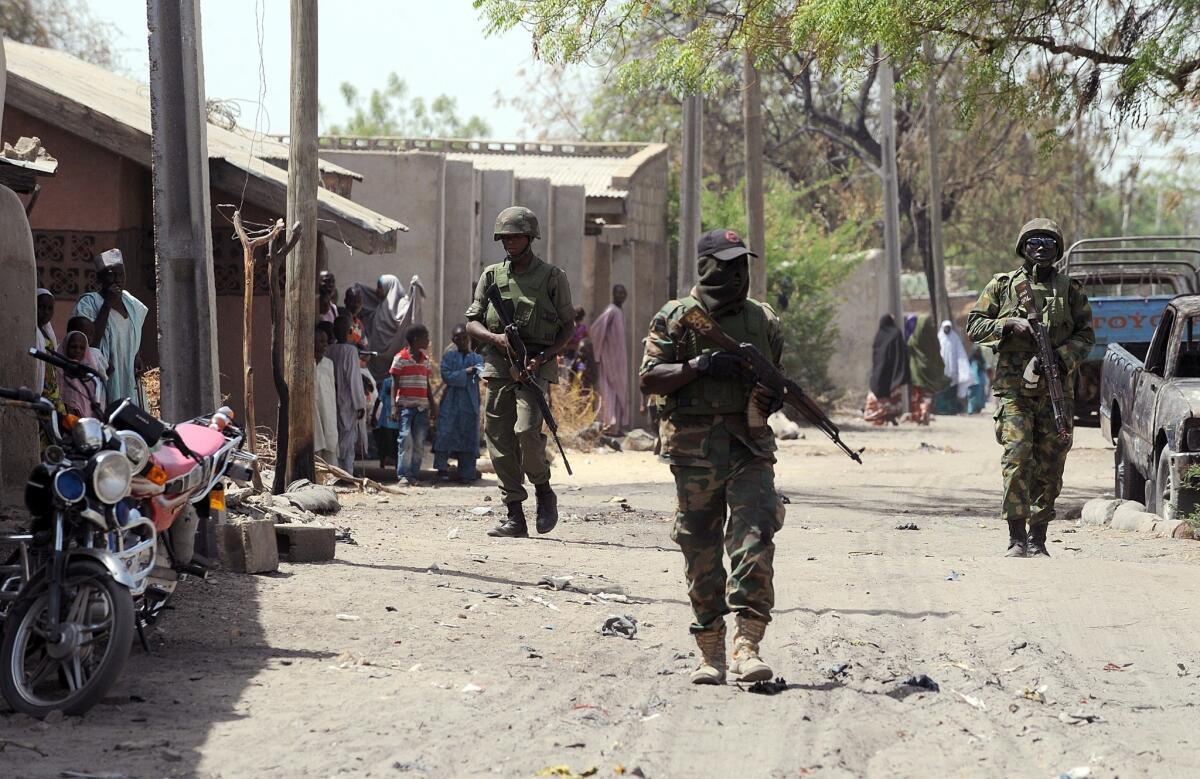Nigeria launches airstrikes against Islamist militants

- Share via
JOHANNESBURG, South Africa -- Security forces in Nigeria have launched airstrikes against encampments of the Islamist militia Boko Haram as part of a major military operation in the country’s northeast, military officials said Friday.
The airstrikes hit one of the main rebel bases, in the Sambisa Forest Reserve south of Maiduguri, the capital of Borno state, according to military officials cited by news agencies.
The Nigerian military have also sent several thousand soldiers to the area in recent days.
Brig. Gen. Chris Olukolade told the Agence France-Presse news service Friday that the air attacks began two days ago. Fighter jets and helicopter gunships are involved in the operation. It was not clear how many people, including Boko Haram fighters, died in the attacks.
“A number of insurgents have been killed. It is not just Sambisa, every camp is under attack. But we have not done the mopping-up operations on the ground to determine the numbers killed,” Olukolade told Reuters news service.
Nigerian President Goodluck Jonathan announced a state of emergency in three northeastern states Tuesday after attempts to negotiate an amnesty and peace deal with Boko Haram failed. He said Nigeria was facing a “war” by the rebels. However, Jonathan also declared a state of emergency in 2011, and beefed up forces then, with little effect.
Boko Haram, styling itself on Afghanistan’s Taliban, emerged in 2002 and launched an armed insurgency several years later. In recent years, it has kidnapped foreigners and carried out hundreds of armed attacks and bombings against security forces, jails, politicians, Christians, bars, bank ATMs and mobile telephone masts. The attacks have left more than 1,600 people dead since 2010, according to the Associated Press.
The group is fighting to overthrow the Nigerian government and impose Islamic sharia law over Nigeria’s 170 million people, who are divided between the mainly Muslim north and mainly Christian south. Boko Haram opposes secularization, in particular secular education.
Nigerian authorities have scaled up military operations in the past but have failed to curb the rebellion. Human Rights Watch and other rights groups have accused security forces of reprisal killings and randomly shooting into crowds of civilians during their operations. Critics argue that the security forces are so heavy-handed that they have increased public sympathy for the rebels in parts of the north.
As Nigerian security forces carried out attacks Thursday, the mobile phone network in the region was switched off, according to local media, in an apparent bid to prevent sympathizers from warning Boko Haram camps of the impending attacks. Service resumed Friday.
The recent fighting followed clashes last month in Baga, a fishing community on Lake Chad, in which 187 people died. It is not known how many of the dead were civilians. At the time, Nigerian Brig. Gen. Austin Edokpaye said the militants were armed with heavy machine guns and rocket-propelled grenades and accused them of using civilians as human shields.
U.S. State Department spokesman Patrick Ventrell this week condemned Boko Haram’s attacks but also called on Nigeria to avoid civilian casualties in its military crackdown.
“We have made clear to the Nigerian government that its heavy-handed response to insecurity in northern Nigeria and the failure to address human rights violations will potentially affect our ability to provide security assistance going forward,” he told reporters.
As fighting took place in the northeast, several gunmen were killed in the northwestern state of Katsina after an attack on a bank and police station. It was not known how many people died or the identities of the attackers.
ALSO:
New videos from Syria spotlight conflict’s brutality
Brazil, Japan, sumo and food, deliciously intertwined
Hunger strike, Yemeni dilemma could spur Guantanamo closure plans
More to Read
Sign up for Essential California
The most important California stories and recommendations in your inbox every morning.
You may occasionally receive promotional content from the Los Angeles Times.













